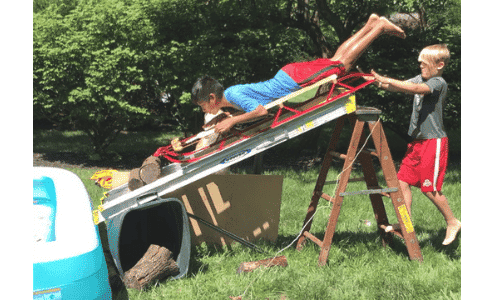7 Questions About ChatGPT: A Guide for Parents of Tweens & Teens

College professors and moms of tweens and teens share the pros and cons of ChatGPT in this guide for parents. Get actionable advice to navigate the potential risks and rewards of AI chatbots with your kids.
If you have kids in high school or college, they’re using ChatGPT. Or they know someone who is. If you have middle schoolers, they may or may not know about it yet. But they will.
I’ve had really interesting discussions about ChatGPT in my college classes, especially after I told my students there would be no judgment from me about why or how they were using it. I just wanted to hear directly from them.
I’ve used it myself to understand more about it firsthand. I’ve talked about it with other college profs and high school teachers.
But when I’ve asked other parents, most have no idea what ChatGPT is. And the others have heard of it, but they don’t know much about it.
If you’re a parent, especially of middle school, high school or college kids, this post is for you. ChatGPT is not a passing fad that you can ignore.
To understand the pros and cons of ChatGPT, you need to ask these 7 questions:
1. What is ChatGPT?
It’s an artificial intelligence chatbot. An AI “chat robot.”
You interact with more chatbots that you realize. Remember the last time you were on a website and couldn’t figure something out or find what you needed? And a box popped up on the screen, inviting you to chat with an expert?
That’s a chatbot. It mimics human conversation based on training to understand human language.
ChatGPT is like those chatbots on steroids. At a basic level, it can answer questions, give information and engage in conversation. But it can also write an essay on any given topic, original lyrics to a song, code for 3D animation…the possibilities are endless.
You can try it out by creating an OpenAI account. As of now, there’s not app, so it only works through a web browser.
2. How does ChatGPT work?
It can be kind of confusing, especially if you don’t have a tech background. So I thought this might be a good place to show you how it works and let ChatGPT answer that question itself in less than a minute:
Crazy, right? And that’s nowhere near all the things ChatGPT can do. If you didn’t catch the responses in the video, see the images below.
The answer to my first question (How does ChatGPT work?) wasn’t as simple as I wanted:
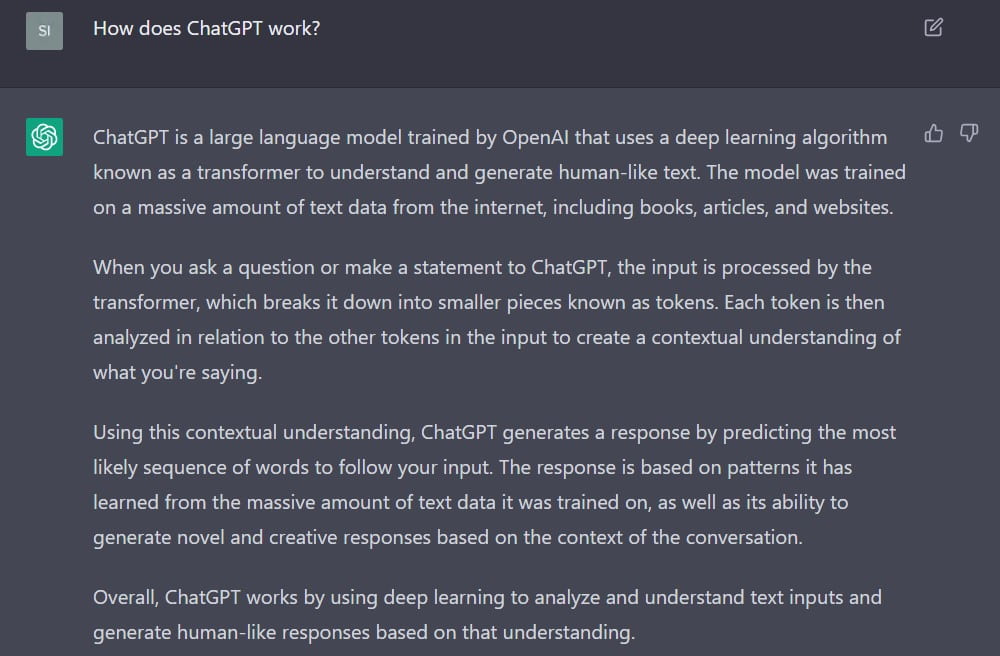
So I asked it to simply the response. I think the answer it came up with is too simplified.
If I wanted to spend more time on this, I could ask it to provide more details, but still using language a middle schooler would understand.
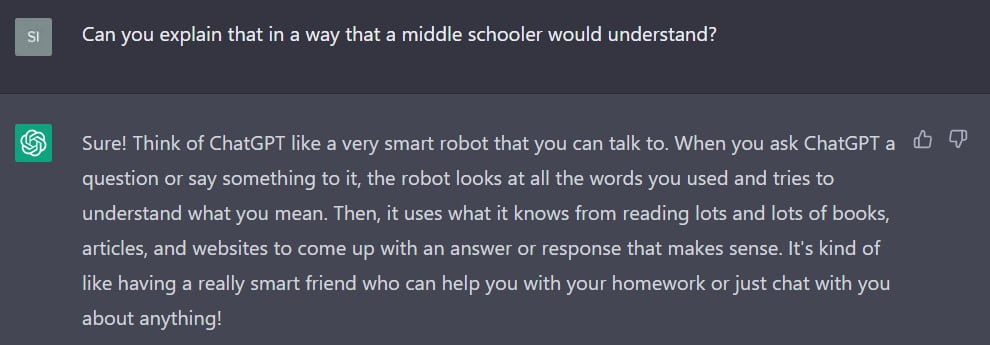
3. What is ChatGPT not able to do?
Although ChatGPT is capable of seemingly endless things, there are some really important things to remember about what it CANNOT do. It’s especially important to communicate these things to our kids.
The last line in the image above bothered me. When I asked ChatGPT to explain things like it was talking to a middle schooler, it said, “It’s kind of like having a really smart friend who can help you with your homework or just chat with you about anything!”
ChatGPT cannot provide emotional support
Yes, you can chat in a way that feels like you’re talking to a person, but you’re not. Our kids are facing more mental health challenges and more self-esteem issues than ever before.
We need to encourage them to seek help from parents, trusted adults and mental health professionals.
ChatGPT does not have emotions or intentions and it is NOT conscious
It’s crazy to need to say this, but spend some time on ChatGPT and you’ll see why people start to wonder if it’s alive.
And why kids might engage with it like it really is a human. And why they need to be reminded that it’s not a real person.
ChatGPT is not connected to the internet
It relies on information through 2021, but cannot give accurate information about current events or anything since 2022.
Notice I said accurate information and not no information. More about this in the risks I discuss below.
Also, be aware that other sophisticated chatbots are coming that will be connected to the internet. Bing Chat is being rolled out now and Google Bard is coming soon.
4. What are the risks of ChatGPT for tweens and teens?
I’m going to limit this answer to parents of kids in middle school, high school and college.
Kids may be exposed to inappropriate content on ChatGPT
ChatGPT is designed to refuse inappropriate requests and will likely get better at doing so, but parents still need to be aware.
The home page lists this as a limitation: “May occasionally produce harmful instructions or biased content.”
ChatGPT is not always accurate
ChatGPT makes this clear on its home page: May occasionally generate incorrect information.” But it likely won’t be easy to detect because information is provided so quickly and presented as fact.
Mary and I spend a lot of time teaching our college students (and our own kids) about media literacy. Being able to to evaluate and analyze information is a critical skill.
I would argue that widespread use of sophisticated chatbots makes media literacy even more essential for our kids.
And since my own teens often ignore my warnings about inaccurate information online, I recorded a video of a question I asked ChatGPT.
By its own admission at the beginning of the answer, ChatGPT doesn’t have knowledge of events after September 2021. So it shouldn’t know anything about the Russian invasion of Ukraine in 2022.
But it goes on to say that “on February 2, 2022, the Biden administration announced new sanctions against Russia….”
This is a perfect example of the importance of media literacy and questioning information that we find online. ChatGPT is still a mind-blowing tool, but we can’t blindly accept everything it says without critically evaluating it.
ChatGPT conversations are not private
Because the technology is constantly learning and improving, kids need to know that real people may be reviewing conversations. And like everything else online, they shouldn’t share any personal information.
You can request that your data be deleted here.
5. What are the benefits of ChatGPT for tweens and teens?
Although much of this post is focused on concerns about ChatGPT, there are a lot of potential benefits!
As a college professor, I’m curious about how I can leverage it to help my students improve their writing, speaking, research and critical thinking skills. Its capabilities fascinate me.
AI chatbots are also here to stay.
My students and my own kids will use chatbots and AI at their internships and jobs, so I do them a disservice if I don’t help them navigate this new disruptive technology responsibly. Truthfully, I don’t know exactly what that looks like, but I’ll keep trying to figure it out.
(I’ll address questions about cheating in the next section. But first, let’s look at the good stuff.)
ChatGPT is free, at least for now
If you have an internet connection, you can access ChatGPT. There is also a paid version that many companies are using for employees.
ChatGPT can help with homework
You know that feeling of dread that comes over you when your middle or high schooler asks for help with a math problem that you forgot how to do decades ago? Or when they’re learning a language that you never studied?
ChatGPT can help with complex math and science concepts and conversation skills in other languages. (Cue the sigh of relief from parents everywhere.)
ChatGPT can be entertaining
One of my college students said he asked ChatGPT to write an argument between Iron Man and Captain America about who was the better superhero. Another used it to create some fun trivia questions with roommates.
Do you have endlessly curious kids? Send them to ChatGPT with all of their random questions.
Want to kill some time with a game where they might actually learn something? Try word association, hangman, word jumble, anagrams and more.
If you search online for fun things to do with ChatGPT, you’ll find all kinds of possibilities.
ChatGPT can help you study for the SAT and other standardized tests
When I asked it for help with the SAT, it said it can help me with practice tests along with tips and strategies for taking the test.
It can also share word lists and quizzes to help build vocabulary and provide feedback on essays.
ChatGPT can encourage or boost creativity
With such a strong emphasis on testing and sharing information in education, a tool like ChatGPT can be a great way to bring more creativity to our kids’ lives.
They could use it to brainstorm ways to make a school presentation more interesting or interactive. Ask it to write a silly children’s story with a crazy combination of characters.
Ask for new hobby ideas based on things they already love doing. Again, the options are really endless.
ChatGPT can help kids set and achieve goals
Wish your tween or teen was better at setting goals? Feel like you’re getting nowhere when you talk to them about their future? Here’s a way ChatGPT can really help.
Mary and her son asked it how to survive as a 6th grader. It said to stay organized, develop good study habits, get involved in activities and more.
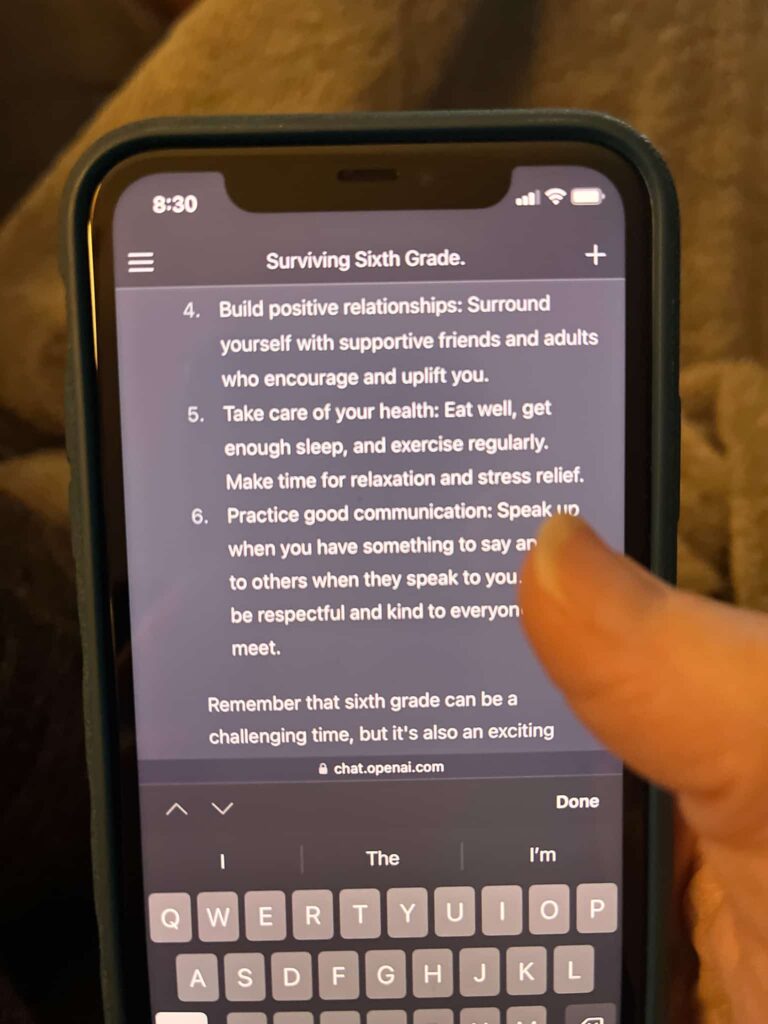
ChatGPT can help students explore jobs and careers
I can’t believe some of the jobs my students land when they graduate. Like a former student who works for a gaming company. Her job is to make sure a video game feels as immersive in one language and culture as it does in another.
Our kids (even college-age) often have limited ideas about the career possibilities in front of them. And as parents, we can only add our own experiences and perspectives to that knowledge.
If you have a kid with different talents and abilities than yours, you may not really know all of the options.
ChatGPT can provide a great starting point for exploring careers based on simple and specific interests.
I asked, “What are some career options for people who are great problem solvers, love to build things and fix things, but who also hate math?” and got this response:
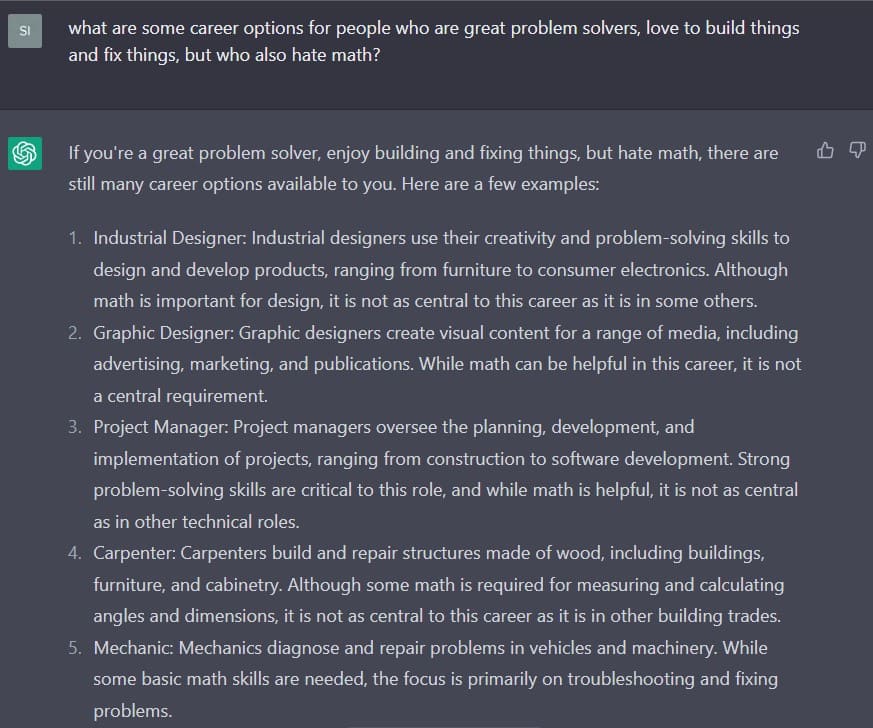
6. What About ChatGPT and cheating?
Answers to this question are all over the place. If you’ve been one of our readers for a while, you know that we’re not alarmists, we believe in thorough research of any topic and we’re usually somewhere in the middle. That’s true here as well.
Yes, it’s very easy to cheat using ChatGPT
It can write a full essay, complete with source information. It can solve a math problem. It can translate a passage into a different language.
My students admitted to using it for discussion posts and for definitions during an online essay exam in other classes.
Tools exist and are being developed to identify cheating and plagiarism using chatbots
Tiffany Sellers, an AP Biology teacher and science department chair, shared that the company they use to check for student plagiarism is rolling out AI capabilities soon.
It won’t be long before other companies do the same and new organizations pop up with other solutions.
“As a high school teacher, if an assignment is really important to me, then it is important enough to have students complete it in class. They still have to edit and give ChatGPT proper parameters. As soon as the students all had devices, they had access to (almost) every key to every assignment. I tell my student all the time: it’s the process that matters. Not the answers. You get out of it what you put in.”
— Tiffany Sellers, Science Department Chair at Academy for the Arts, Science, and Technology in Myrtle Beach, SC
We must talk about the ethics of AI and chatbots with our tweens and teens
This is a perfect opportunity to talk about complex ideas and encourage critical thinking – the very things people worry will disappear with increased use of AI.
Have conversations about cheating, privacy, media literacy and more. Talking about hard and uncomfortable topics with our tweens and teens is something we just have to do.
Educators (like us) will have to adapt how we teach and evaluate students
If we truly want our students to be successful beyond our classrooms, we can’t approach this disruptive technology with fear. We also can’t ignore it.
I don’t think this marks the end of essay writing, but it means it will definitely change. The calculator changed how we teach math and the internet changed how we teach research skills.
Our tweens and teens need to be aware of expectations around the use of chatbots in their classes
Our kids are likely to encounter a lot of different approaches to chatbots in education. Some school districts have already banned ChatGPT and others are having constant conversations about how to handle it.
It will be their responsibility to understand what is acceptable and what isn’t. They’ll have to ask questions and carefully read policies to make sure they’re not guilty of academic misconduct.
7. What are some good resources about ChatGPT for parents?
We have a few sites and organizations that we trust when it comes to information about technology and our kids:
PBS article: A firsthand account about using ChatGPT for a school report.
The New York Times article: What students are saying about ChatGPT

![Cool Stocking Stuffer Ideas for Teens [2024]](https://www.salteffect.com/wp-content/uploads/2023/11/Stocking23-768x512.jpg)
